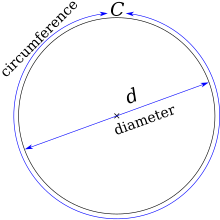The radius is the defining feature of the circle............that and the point u start from..........the center........2 and one...........1/2 or 2/1............................
Fundamentals
Name
The symbol used by mathematicians to represent the ratio of a circle's circumference to its diameter is the lowercase
Greek letter π, sometimes spelled out as
pi, and derived from the first letter of the Greek word
perimetros, meaning circumference.
[6] In English,
π is
pronounced as "pie" (
,
paɪ).
[7] In mathematical use, the lowercase letter
π (or π in
sans-serif font) is distinguished from its capitalized and enlarged counterpart
∏, which denotes a
product of a sequence, analogous to how
∑ denotes
summation.
The choice of the symbol
π is discussed in the section
Adoption of the symbol π.
Definition

The circumference of a circle is slightly more than three times as long as its diameter. The exact ratio is called
π.
π is commonly defined as the
ratio of a
circle's
circumference C to its
diameter d:
[8]

The ratio
C/d is constant, regardless of the circle's size. For example, if a circle has twice the diameter of another circle it will also have twice the circumference, preserving the ratio
C/d. This definition of
π implicitly makes use of
flat (Euclidean) geometry; although the notion of a circle can be extended to any
curved (non-Euclidean) geometry, these new circles will no longer satisfy the formula
π = C/d.
[8] Here, the circumference of a circle is the
arc length around the perimeter of the circle, a quantity which can be formally defined independently of geometry using
limits, a concept in
calculus.
[9] For example, one may compute directly the arc length of the top half of the unit circle given in
Cartesian coordinates by
x2 + y2 = 1, as the
integral:
[10]

An integral such as this was adopted as the definition of
π by
Karl Weierstrass, who defined it directly as an integral in 1841.
[11]


No comments:
Post a Comment